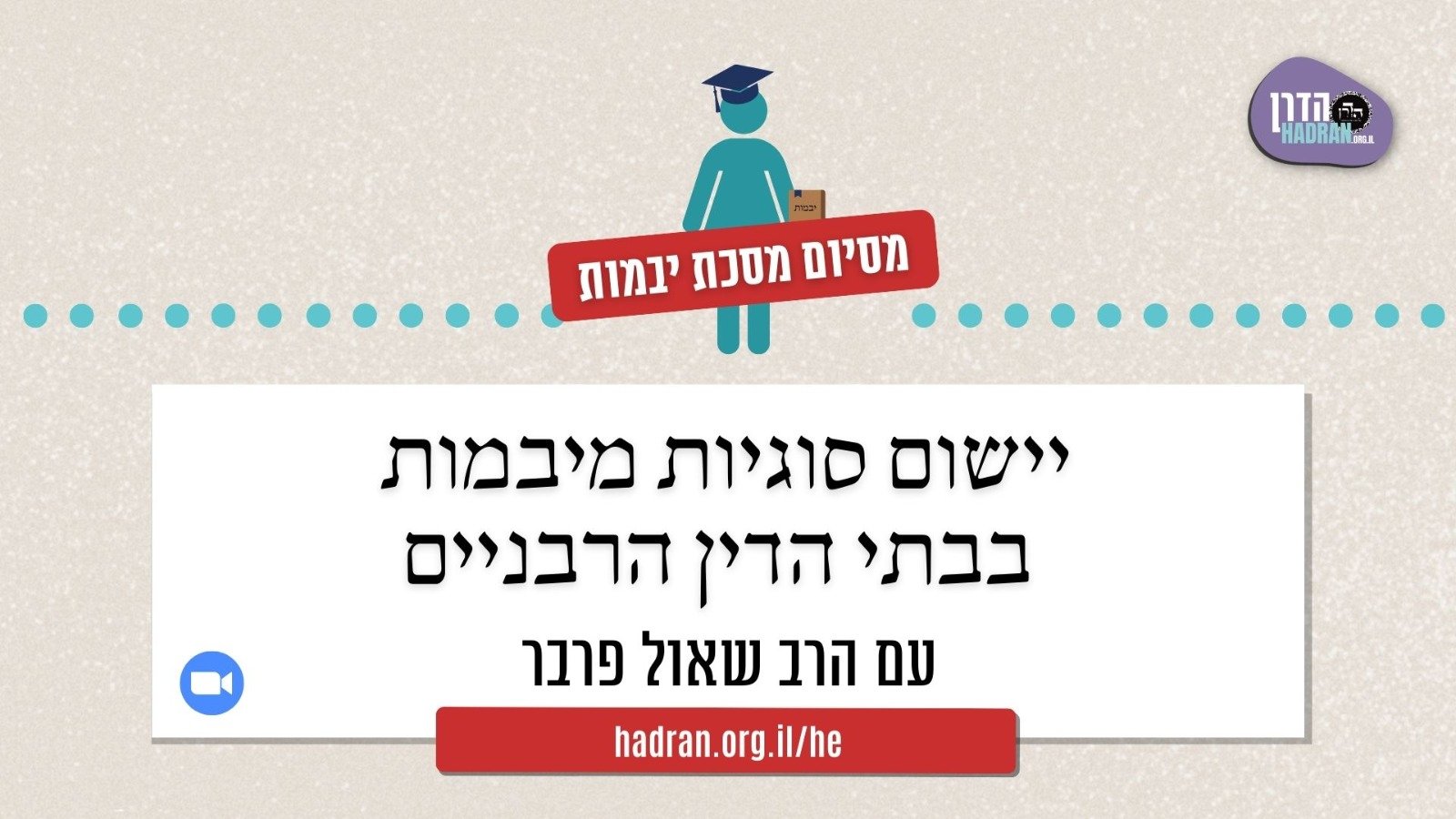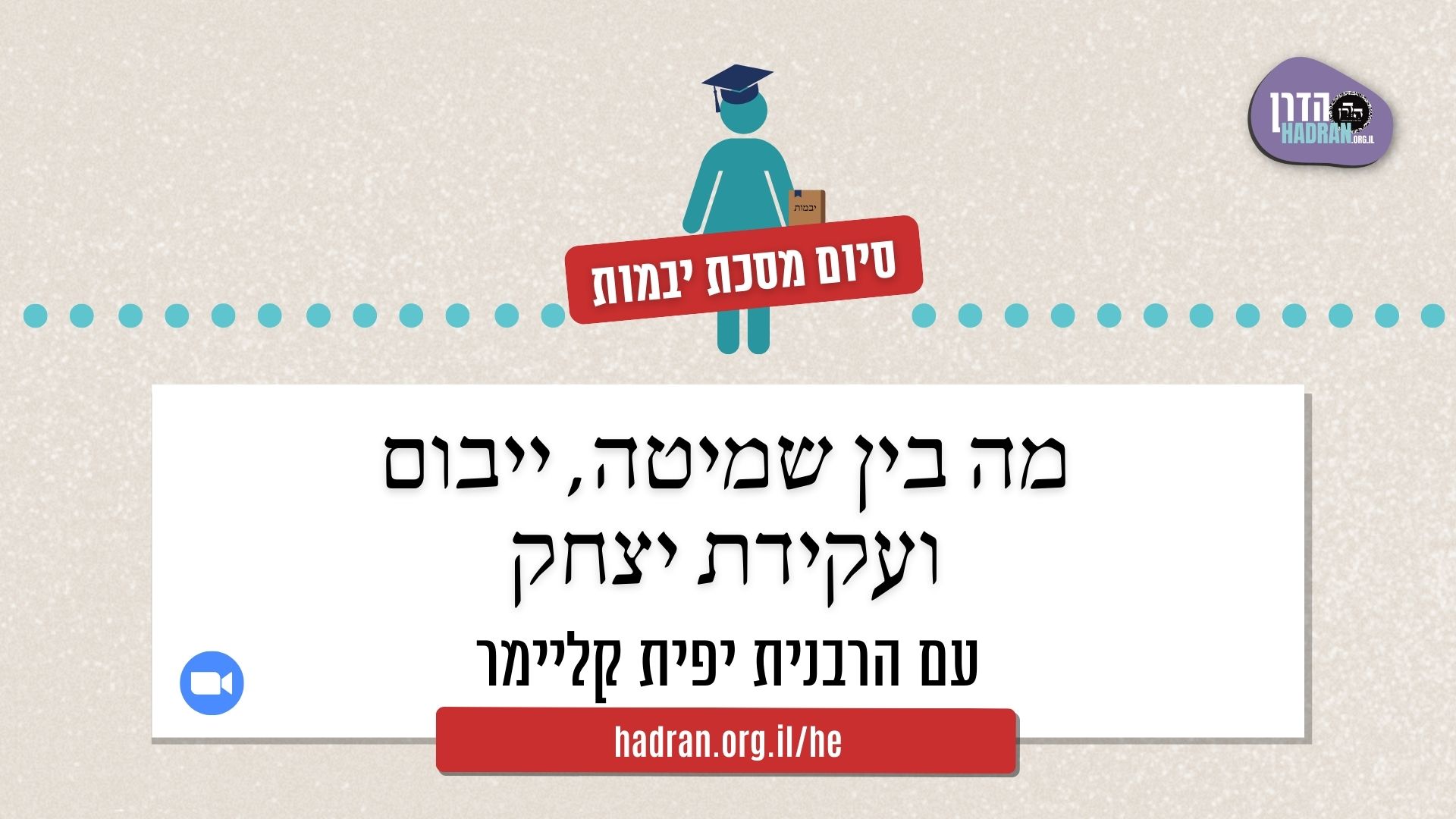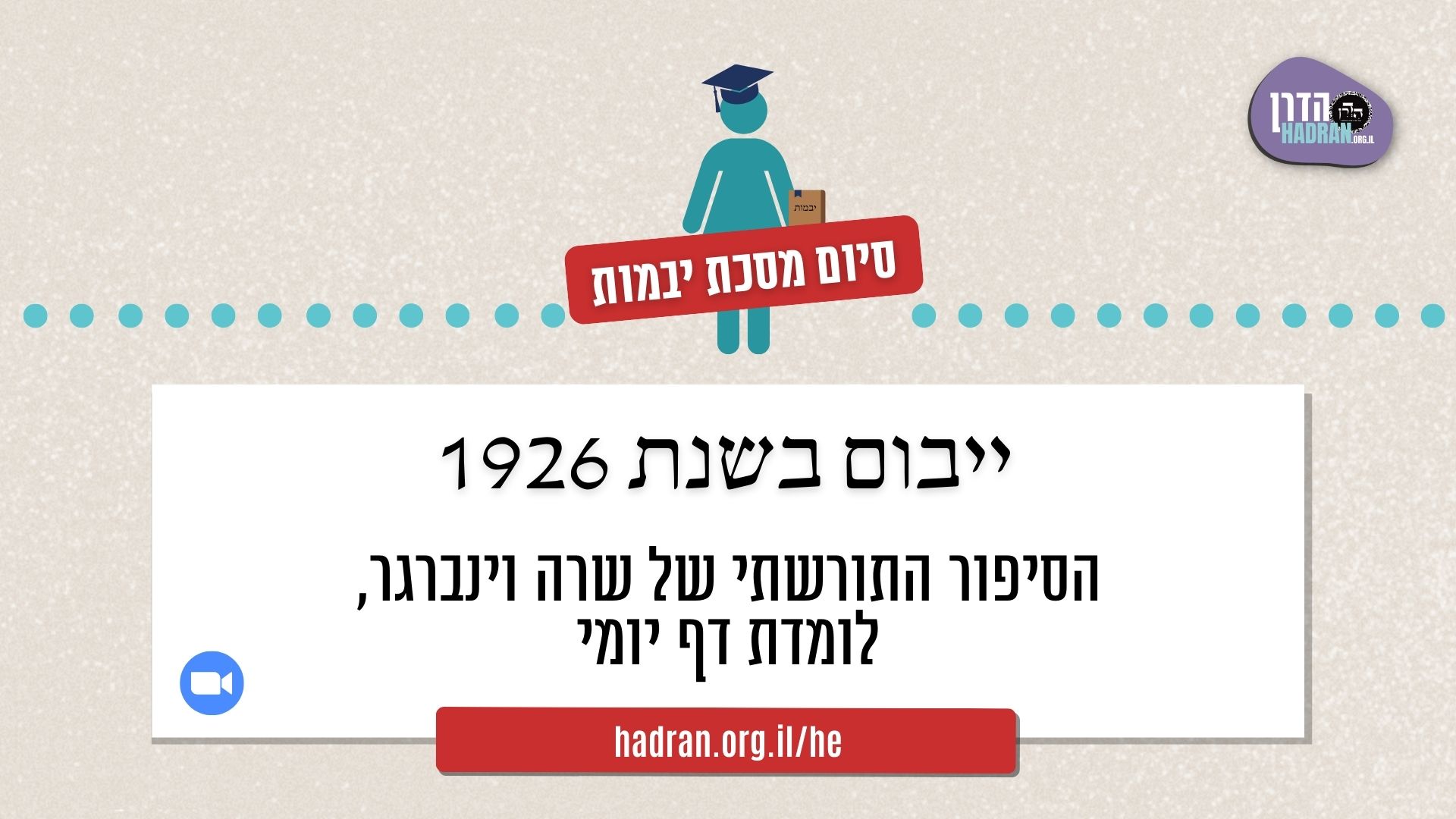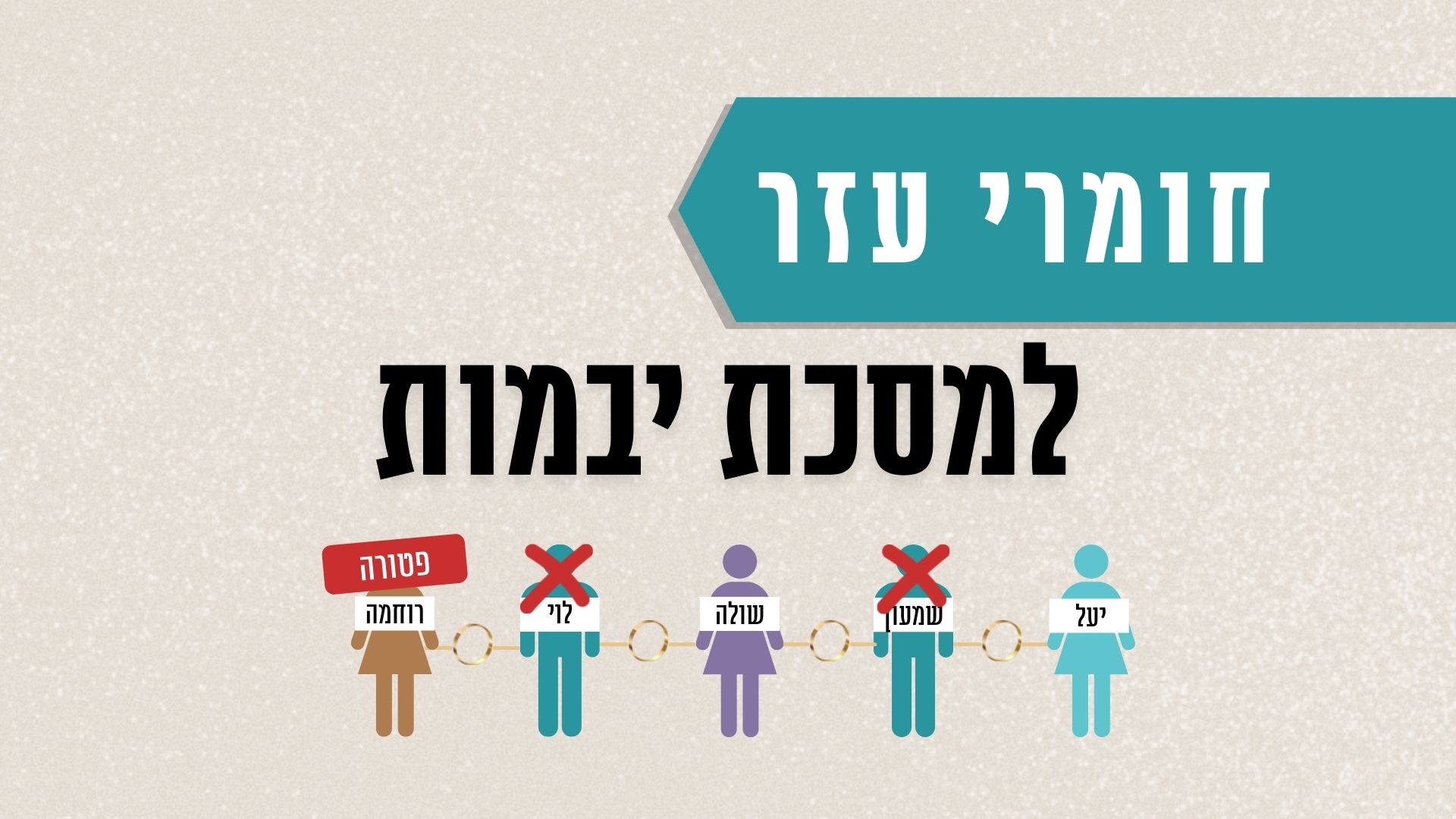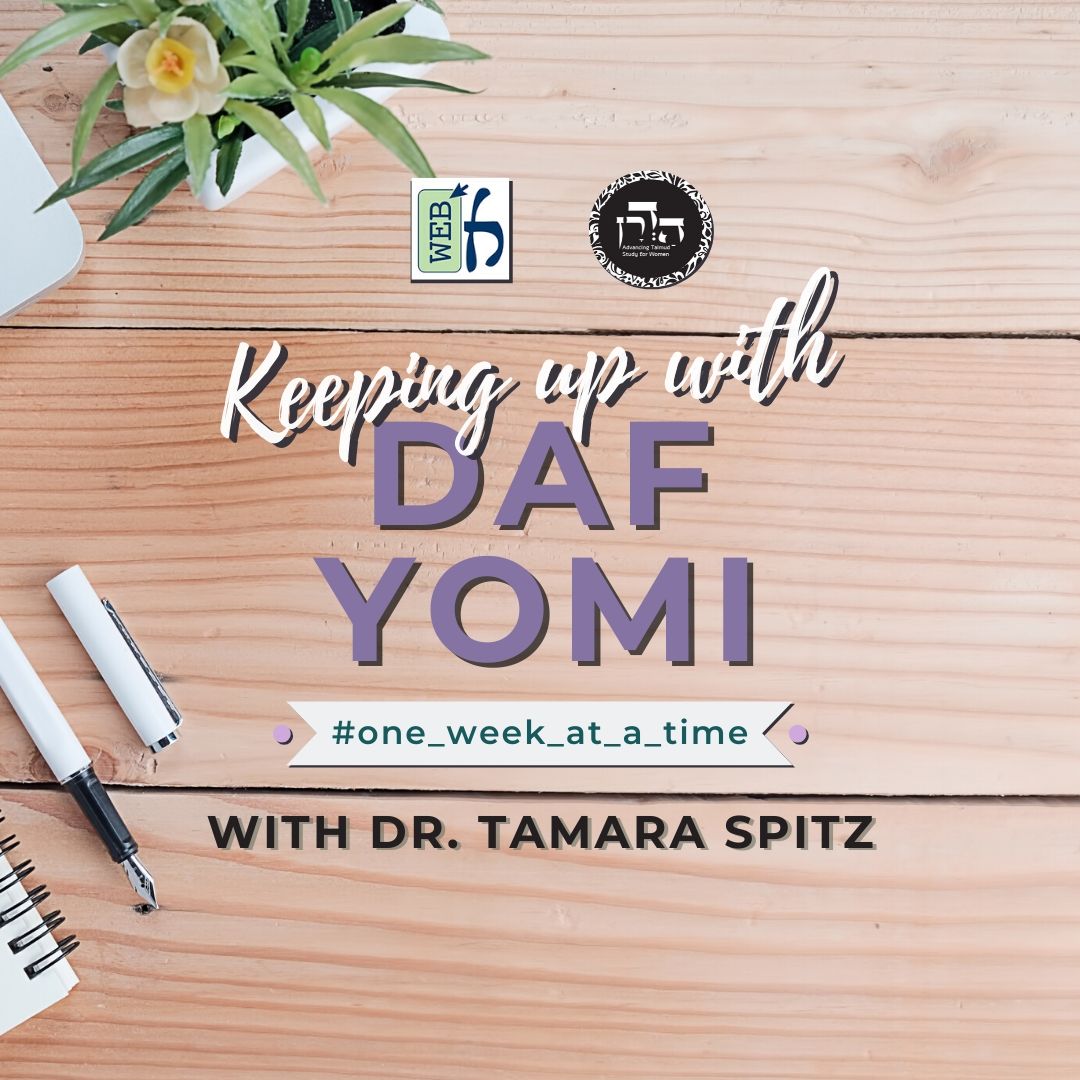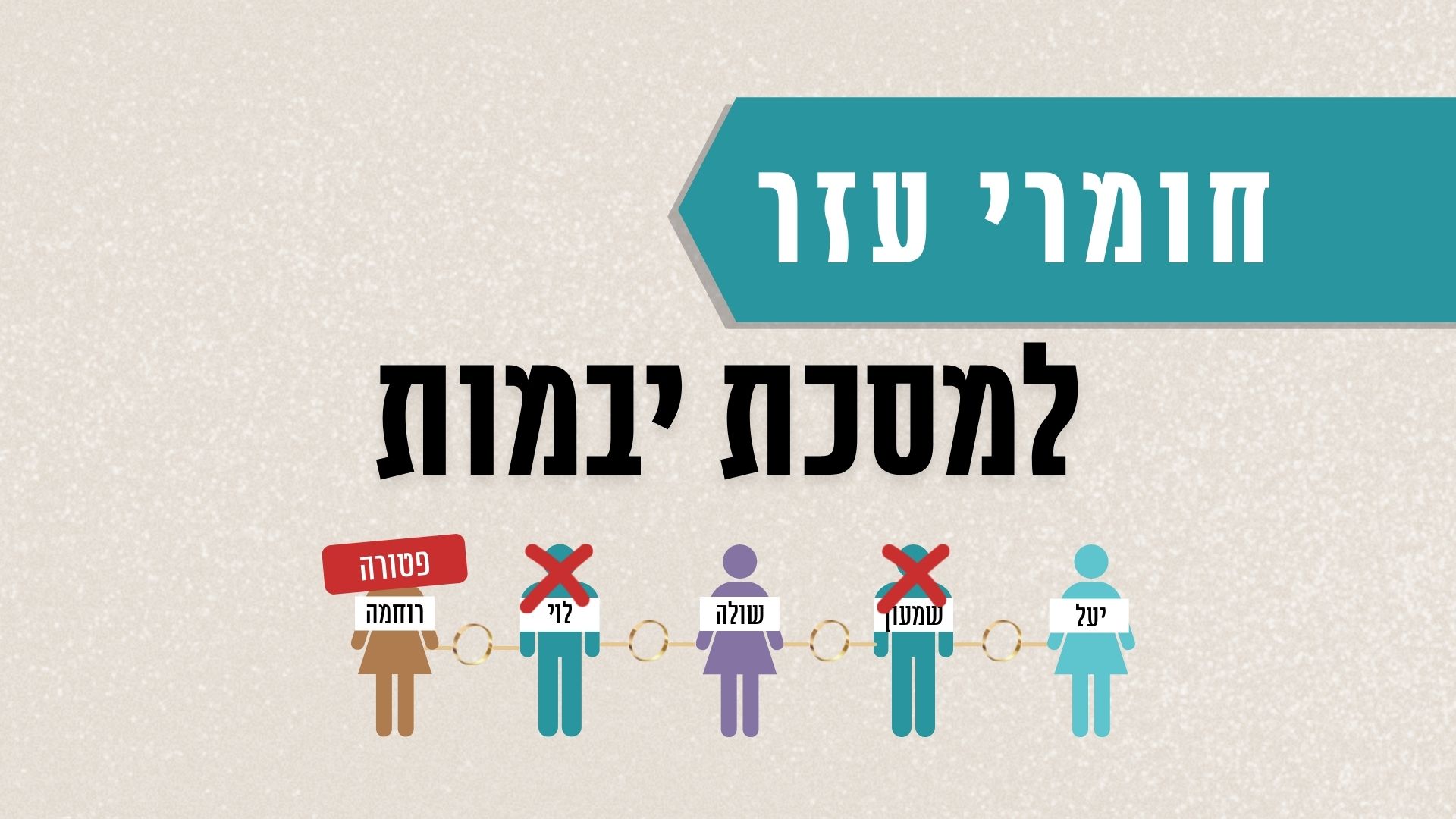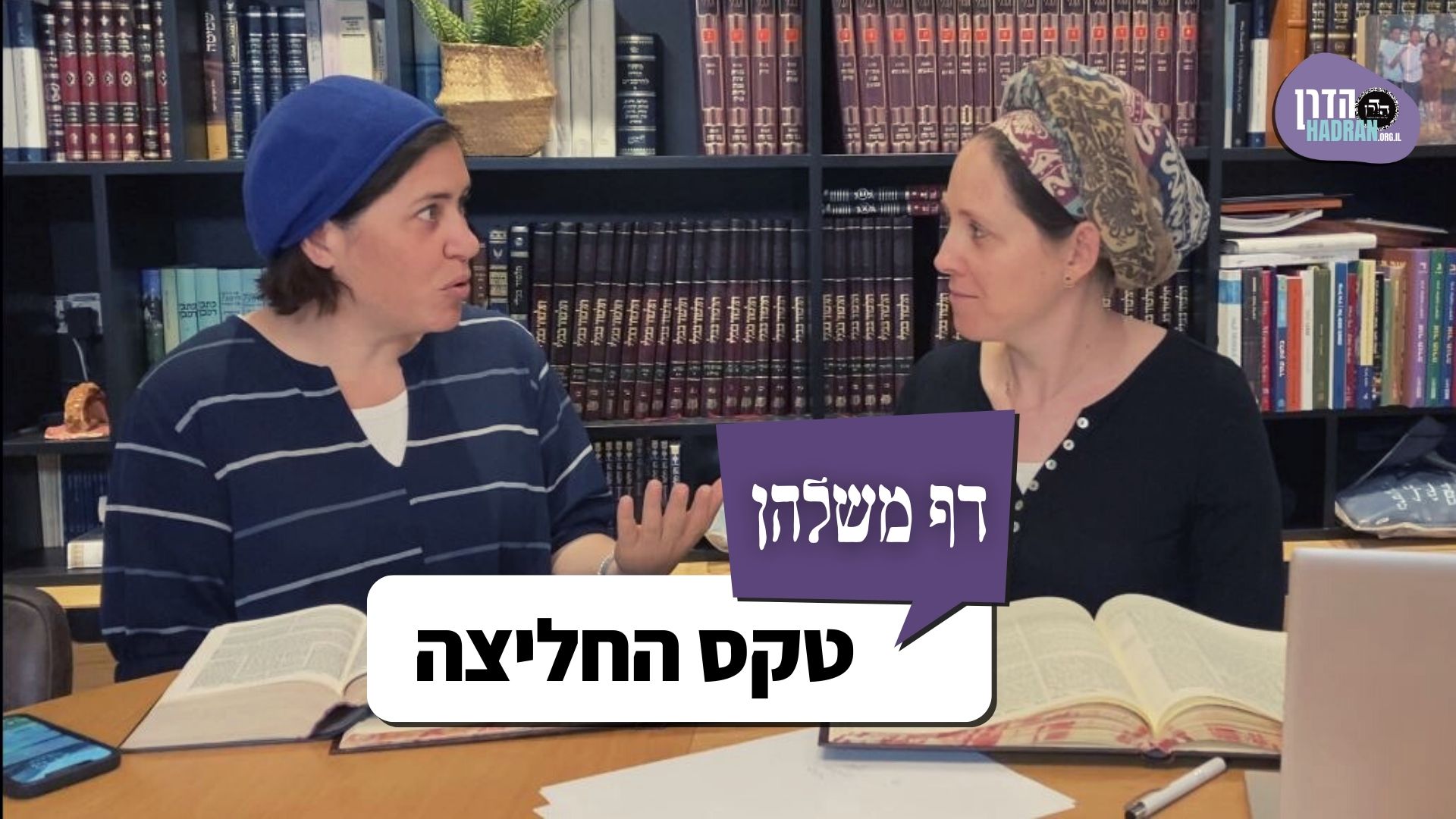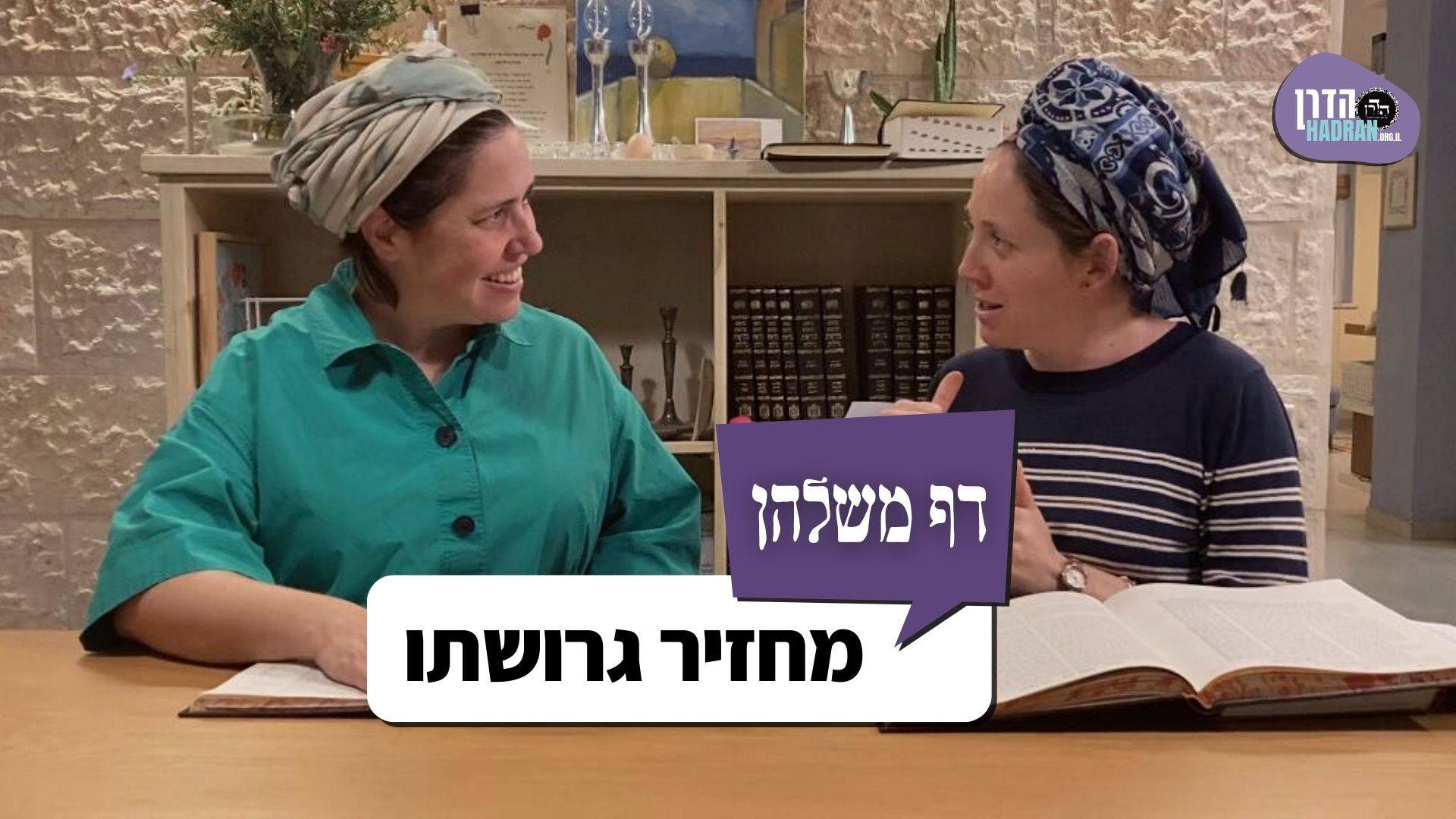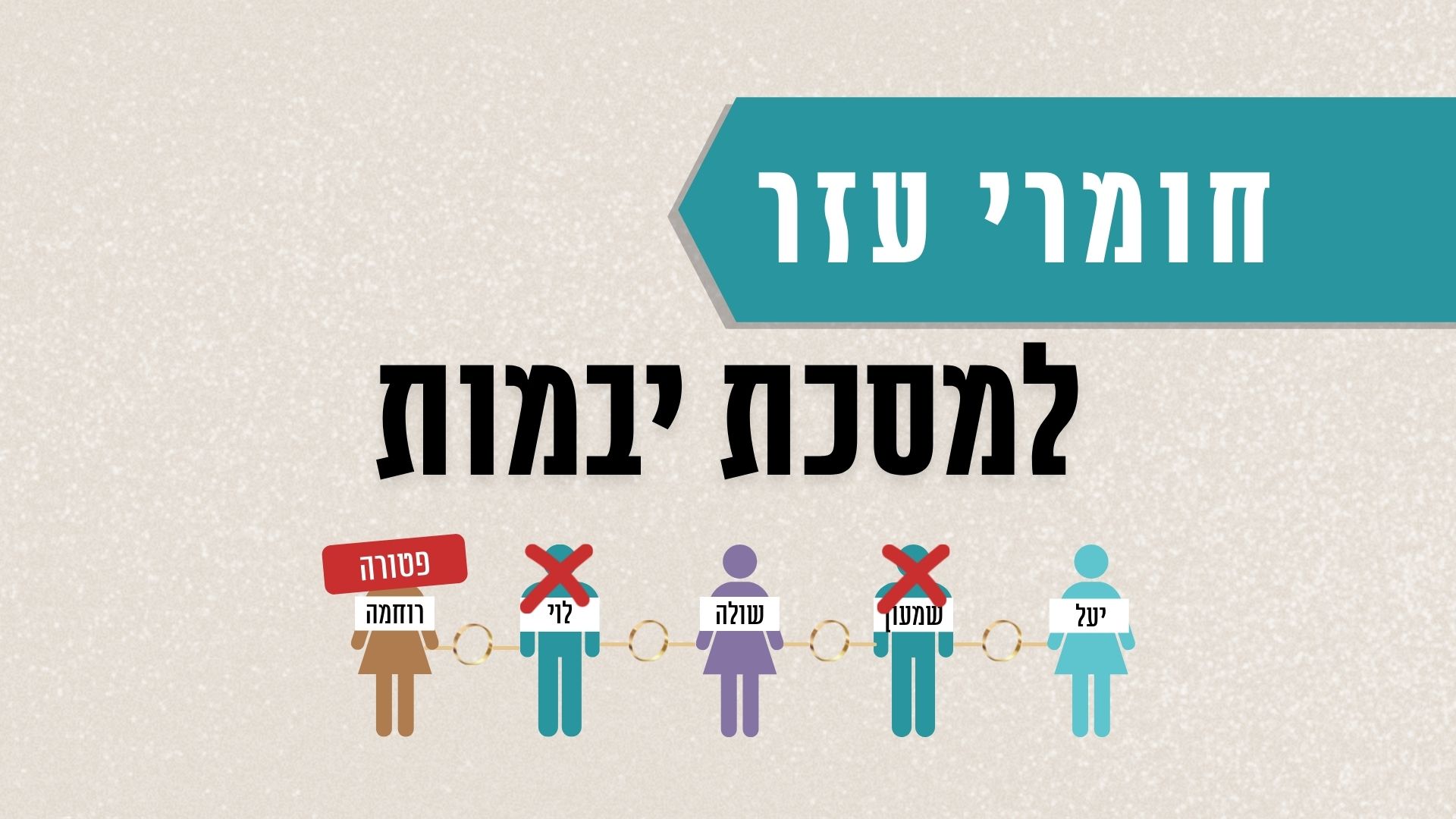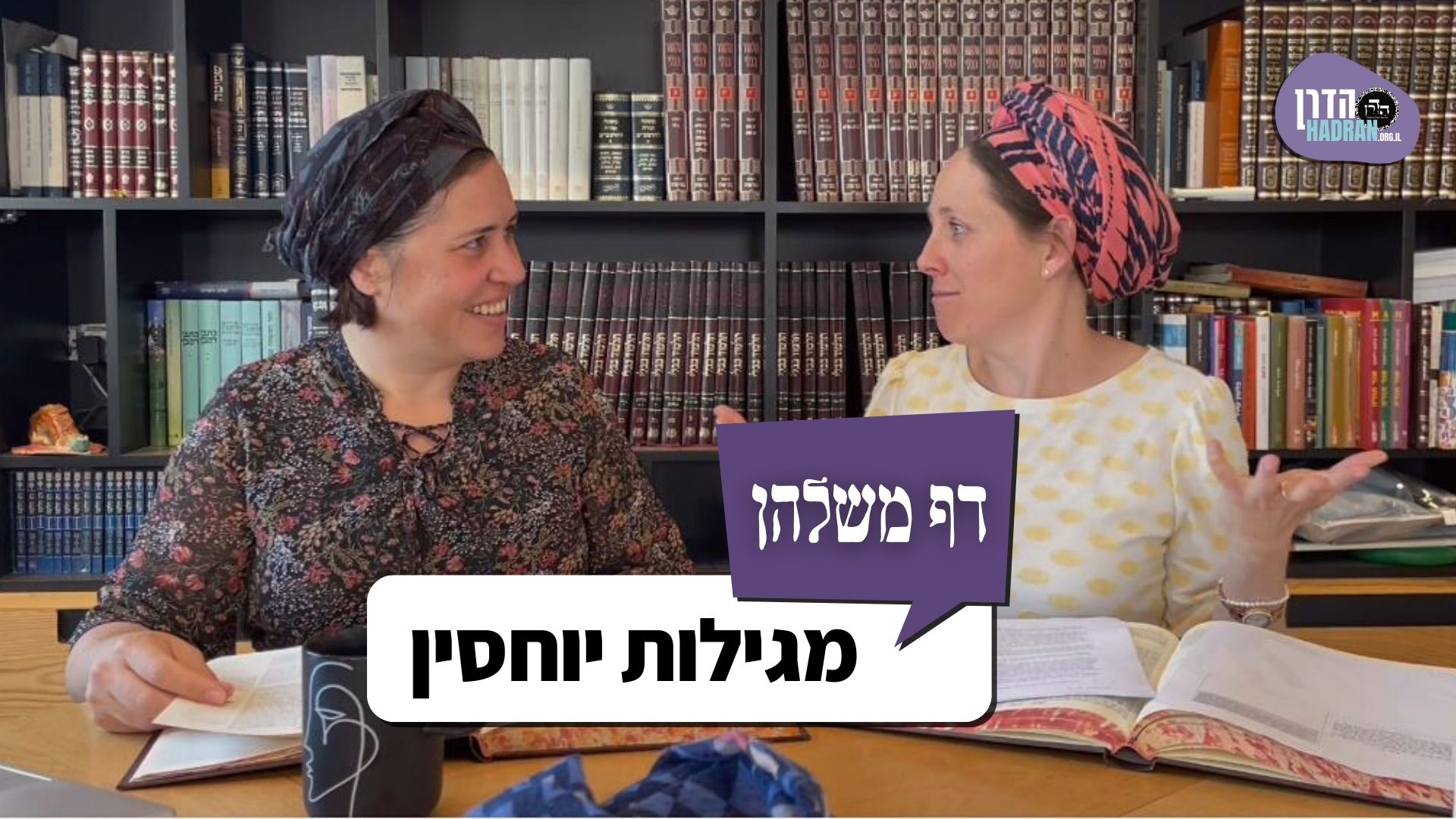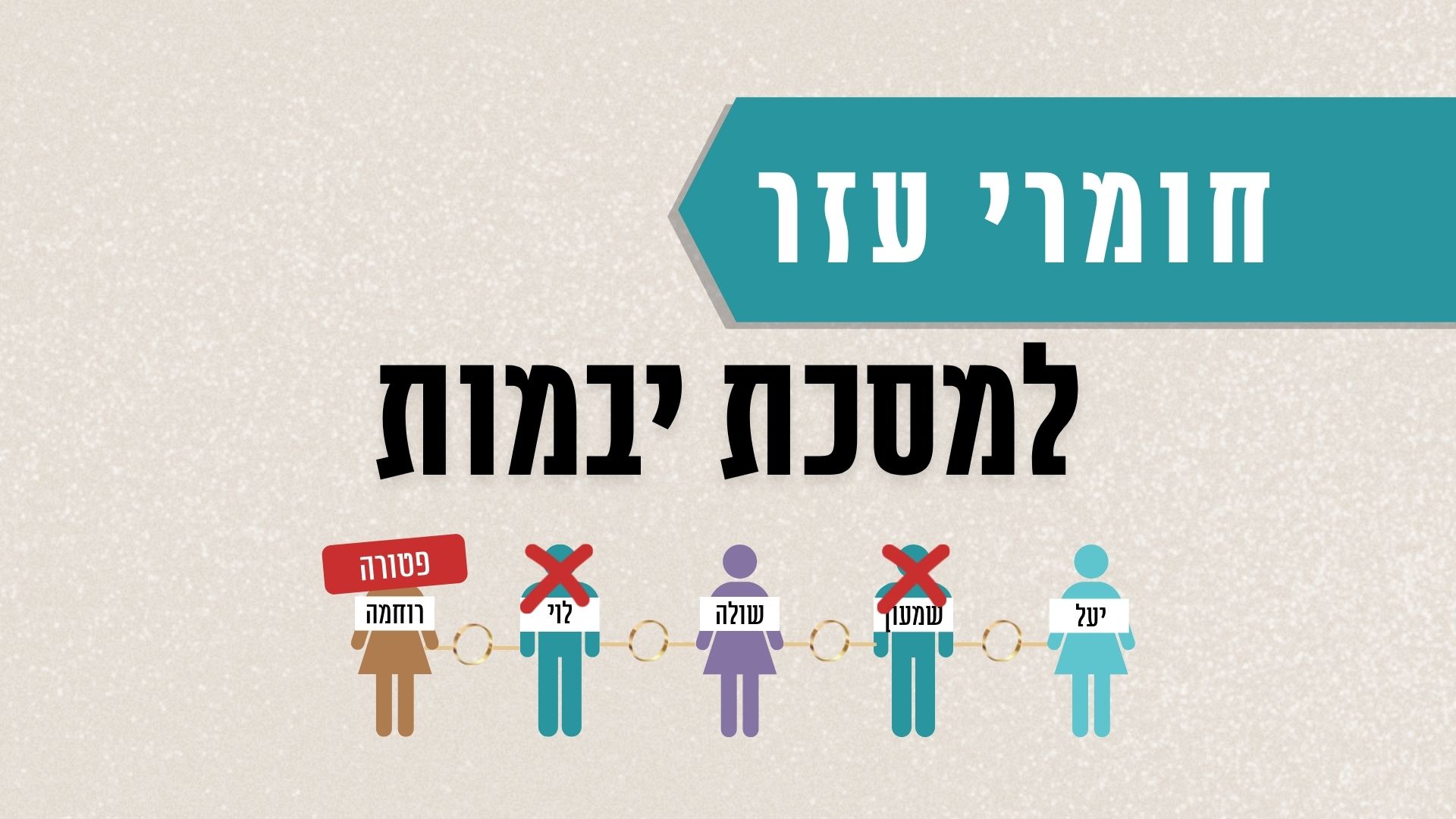יבמות ח
תִּינַח הֵיכָא דְּנָשָׂא מֵת וְאַחַר כָּךְ נָשָׂא חַי. דְּמִגּוֹ דְּאִישְׁתְּרִי אִיסּוּר אֵשֶׁת אָח — אִישְׁתְּרִי נָמֵי אִיסּוּר אֲחוֹת אִשָּׁה.
This works out well when the deceased brother had first married one of the sisters, who was thereby rendered prohibited to the yavam as his brother’s wife, and only afterward had the living brother married her sister, which renders his brother’s wife forbidden to him on another count, this time as his wife’s sister. As in that case one can say that since the first prohibition with regard to a brother’s wife was subsequently nullified and thereby permitted by the mitzva of levirate marriage, the prohibition with regard to a wife’s sister was also nullified and thereby permitted.
אֶלָּא נָשָׂא חַי, וְאַחַר כָּךְ נָשָׂא מֵת — אִיסּוּר אֲחוֹת אִשָּׁה קָדֵים.
However, if the reverse occurred, and first the living brother had married his wife and only afterward the deceased brother had married her sister, in this case the prohibition with regard to a wife’s sister precedes the prohibition proscribing a brother’s wife, i.e., she was initially forbidden to him as his wife’s sister. Consequently, even when the second prohibition lapses upon the death of his childless brother, the first prohibition should remain intact.
וַאֲפִילּוּ נָשָׂא מֵת נָמֵי, תִּינַח הֵיכָא דְּנָשָׂא מֵת, וּמֵת, וְאַחַר כָּךְ נָשָׂא חַי — דְּחַזְיָא לֵיהּ דְּבֵינֵי בֵּינֵי. אֶלָּא נָשָׂא מֵת, וְלֹא מֵת, וְאַחַר כָּךְ נָשָׂא חַי — לָא אִיחַזְיָא לֵיהּ כְּלָל.
And furthermore, even in a case where the deceased brother had married first, it works out well only when the deceased brother had married the woman and then died, and only afterward the surviving brother married that brother’s wife’s sister. The reason is that in this case, the sister of the wife of the deceased brother was fit for him in between, i.e., during the period from when the deceased brother died until he married that brother’s wife’s sister. Therefore, it can be claimed that the second prohibition should not apply. However, if the deceased brother married first, and did not die yet, and afterward, during the deceased brother’s lifetime, the living brother married the deceased brother’s wife’s sister, she was not fit for him at all, as there was no period of time during which she was permitted to him.
מִי לָא מוֹדֵי עוּלָּא שֶׁאִם רָאָה קֶרִי בְּלֵיל שְׁמִינִי, שֶׁאֵין מַכְנִיס יָדָיו לַבְּהוֹנוֹת, שֶׁלֹּא יָצָא בְּשָׁעָה שֶׁהִיא רְאוּיָה לְהָבִיא בָּהּ קׇרְבָּן.
The Gemara provides proof for this claim: Doesn’t Ulla agree that if a leper experienced a seminal emission on the night of the eighth, not on the eighth day but on the previous night, that he may not insert his hands and feet to the thumb and big toe to receive the blood and oil for his purification? The reason is that in this case he is ritually impure due to the emission and he had not yet emerged from the impurity of leprosy at a time that is fitting to bring an offering, as he cannot sacrifice his offerings until the daylight hours of the eighth day. Since there was not a single moment when he was permitted to enter the Temple in his state of ritual impurity, in this case one cannot apply the principle: Since it is permitted, it is permitted.
אֶלָּא: כִּי אִיצְטְרִיךְ ״עָלֶיהָ״ — הֵיכָא דְּנָשָׂא מֵת, וּמֵת, וְאַחַר כָּךְ נָשָׂא חַי.
§ Rather, the Gemara suggests that the phrase “with her,” which teaches the prohibition with regard to a wife’s sister in levirate marriage, is necessary for a case where the deceased brother had first married and then died, and only afterward the living brother married the sister of the deceased brother’s wife, in which case his brother’s wife was permitted to him for a period of time. Accordingly, one might have applied the principle: Since it is permitted, it is permitted. For this reason it was necessary to write “with her,” to teach that this second woman is nevertheless forbidden as his wife’s sister.
וְאִי בָּעֵית אֵימָא: אָתְיָא בְּהֶיקֵּישָׁא מִדְּרַבִּי יוֹנָה. דְּאָמַר רַבִּי יוֹנָה, וְאִיתֵּימָא רַב הוּנָא בְּרֵיהּ דְּרַב יְהוֹשֻׁעַ, אָמַר קְרָא: ״כִּי כׇּל אֲשֶׁר יַעֲשֶׂה מִכֹּל הַתּוֹעֵבוֹת הָאֵלֶּה וְנִכְרְתוּ״, הוּקְשׁוּ כׇּל הָעֲרָיוֹת כּוּלָּן לְאֵשֶׁת אָח: מָה אֵשֶׁת אָח — שַׁרְיָא, אַף כׇּל עֲרָיוֹת — נָמֵי שַׁרְיָין, כְּתַב רַחֲמָנָא ״עָלֶיהָ״.
And if you wish, say instead that the suggestion that other women with whom relations are forbidden are permitted in levirate marriage is derived from the juxtaposition of Rabbi Yona. As Rabbi Yona said, and some say this was stated by Rav Huna, son of Rav Yehoshua: The verse states: “For whoever shall do any of these abominations, the souls that do them shall be cut off from among their people” (Leviticus 18:29). In this verse all of the women with whom relations are forbidden are juxtaposed with the case of a brother’s wife. Consequently, one might say that just as a brother’s wife is permitted in levirate marriage, so too, all women with whom relations are forbidden are likewise permitted. Therefore, the Merciful One writes: “With her,” which excludes the prohibition with regard to a wife’s sister.
אֲמַר לֵיהּ רַב אַחָא מִדִּפְתִּי לְרָבִינָא: מִכְּדִי כֹּל עֲרָיוֹת, אִיכָּא לְאַקּוֹשִׁינְהוּ לְאֵשֶׁת אָח, וְאִיכָּא לְאַקּוֹשִׁינְהוּ לַאֲחוֹת אִשָּׁה. מַאי חָזֵית דְּאַקֵּשְׁתְּ לַאֲחוֹת אִשָּׁה? אַקְּשִׁינְהוּ לְאֵשֶׁת אָח!
Against this proof, Rav Aḥa of Difti said to Ravina: Since the halakha of all women with whom relations are forbidden can be juxtaposed with the case of a brother’s wife and thereby rendered permitted in levirate marriage, and these cases can equally be juxtaposed with the halakha of a wife’s sister, which would mean that they are forbidden, what did you see that you juxtaposed them with a wife’s sister? Juxtapose them instead with a brother’s wife. If so, the opposite could be derived from the phrase “with her,” i.e., not that all women with whom relations are forbidden are prohibited like a wife’s sister, but that all these women are permitted in levirate marriage, even a wife’s sister.
אִיבָּעֵית אֵימָא: לְקוּלָּא וְחוּמְרָא — לְחוּמְרָא מַקְּשִׁינַן. אִיבָּעֵית אֵימָא: הָכָא תְּרֵי אִיסּוּרֵי, וְהָכָא תְּרֵי אִיסּוּרֵי — וּתְרֵי מִתְּרֵי יָלְפִינַן. אֲבָל הָכָא חֲדָא אִיסּוּרָא — וּתְרֵי מֵחֲדָא לָא יָלְפִינַן.
The Gemara answers: If you wish, say that if one must decide between two possible ways of understanding juxtaposed cases, one of which leads to a lenient ruling and the other to a stringent ruling, we juxtapose to reach the stringent ruling, not the leniency. If you wish, say instead: Here, there are two prohibitions, a brother’s wife and a wife’s sister, and there, in the case of all other women with whom relations are forbidden, there are also two prohibitions. And one may derive a case involving two prohibitions from another case that involves two prohibitions. However, here, in the case of a regular levirate marriage that does not involve any other forbidden relation, there is only one prohibition proscribing a brother’s wife, and one may not derive a case involving two prohibitions from a case that involves only one.
רָבָא אָמַר: עֶרְוָה לָא צְרִיכָא קְרָא, דְּאֵין עֲשֵׂה דּוֹחֶה לֹא תַעֲשֶׂה שֶׁיֵּשׁ בּוֹ כָּרֵת. כִּי אִיצְטְרִיךְ קְרָא לְמֵיסַר צָרָה.
§ Rava said that this entire halakha must be understood differently. With regard to a forbidden relation herself, it is not necessary for a verse to teach that she cannot enter into levirate marriage, as a positive mitzva does not override a prohibition that includes karet. Rather, the verse “with her” is necessary to prohibit a rival wife, as a rival wife is not prohibited to the yavam as a forbidden relation.
וְעֶרְוָה לָא צְרִיכָא קְרָא? וְהָא תַּנְיָא: אֵין לִי אֶלָּא הִיא!
The Gemara asks: And does the tanna in fact maintain with regard to a forbidden relation that it is not necessary for a verse to teach that she is prohibited in levirate marriage? But isn’t it taught in that same baraita: I have derived nothing other than that this woman is exempt from levirate marriage. From where is it inferred that the same applies to her rival wife? This shows that the case of a forbidden relation does require a special inference from a verse.
מִשּׁוּם צָרָתָהּ.
The Gemara answers: It is due to her rival wife, i.e., the baraita does not mean that the halakha of women with whom relations are forbidden is derived from this verse; rather, this case is mentioned only to introduce the case of a rival wife.
וְהָא קָתָנֵי: אֵין לִי אֶלָּא הֵן! מִשּׁוּם צָרוֹתֵיהֶן.
The Gemara raises another difficulty: But it is taught in the baraita: I have derived nothing other than that these sisters are exempt from levirate marriage, which again suggests that the derivation from the verse applies to all of them. This is similarly rejected: This is also stated due to their rival wives.
תָּא שְׁמַע, רַבִּי אוֹמֵר: ״וְלָקַח״ ״וּלְקָחָהּ״, ״וְיִבֵּם״ ״וְיִבְּמָהּ״ — לֶאֱסוֹר צָרוֹת וַעֲרָיוֹת.
The Gemara suggests: Come and hear a different baraita that contradicts Rava’s statement: Rabbi Yehuda HaNasi says that there is a different proof that a forbidden relation and her rival wife are prohibited in levirate marriage. The Torah says: “He will have intercourse with her and take her to him to be his wife and consummate the levirate marriage with her” (Deuteronomy 25:5). Since the verse does not say simply: Have intercourse, but: “Have intercourse with her,” this indicates that he takes this woman specifically, not a different woman who is forbidden. Furthermore, the verse does not simply state: And consummate the levirate marriage, but: “And consummate the levirate marriage with her.” These additions serve to prohibit rival wives and women with whom relations are forbidden.
אֵימָא: לֶאֱסוֹר צָרוֹת שֶׁל עֲרָיוֹת. וְהָא תְּרֵי קְרָאֵי קָנָסֵיב לֵיהּ, מַאי לָאו: חַד לְעֶרְוָה וְחַד לְצָרָה?
This shows that even the prohibition with regard to women with whom relations are forbidden requires a special inference. The Gemara answers: Amend the language of the baraita and say: To prohibit rival wives of those with whom relations are forbidden, not the women themselves with whom relations are forbidden. The Gemara raises a difficulty: But he brought two proofs from the verse, both “have intercourse with her” and “and consummate the levirate marriage with her.” What, is it not because one phrase is required for the halakha of a woman with whom relations are forbidden and the other one for a rival wife?
לָא, אִידִי וְאִידִי לְצָרָה: חַד לְמֵיסַר צָרָה בִּמְקוֹם מִצְוָה, וְחַד לְמִישְׁרֵי צָרָה שֶׁלֹּא בִּמְקוֹם מִצְוָה.
The Gemara rejects this suggestion: No, this source and that source are necessary for a rival wife, and both phrases are required, for the following reason. One of them comes to prohibit a rival wife in a place where the mitzva of levirate marriage is applicable, and one serves to permit a rival wife in a place where the mitzva is not applicable. If a woman is the rival wife of one of those relatives forbidden to a given man, he is permitted to marry her following the death of her husband, as the prohibition proscribing rival wives of women with whom relations are forbidden pertains only to cases where the halakhot of levirate marriage are applicable, i.e., in the case of a brother’s wife.
מַאי טַעְמָא — ״וְיִבֵּם״ ״וְיִבְּמָהּ״: בִּמְקוֹם יִיבּוּם הוּא דַּאֲסִירָא צָרָה, שֶׁלֹּא בִּמְקוֹם יִיבּוּם — שַׁרְיָא צָרָה.
The Gemara elaborates: What is the reason for this halakha? It is derived from the fact that the verse does not merely state: And consummate the levirate marriage, but instead emphasizes: “And consummate the levirate marriage with her.” This comes to teach: It is in a place where levirate marriage applies that a rival wife is prohibited; however, in a place where the levirate marriage is not applicable, a rival wife is permitted.
אָמַר רַב אָשֵׁי: מַתְנִיתִין נָמֵי דַּיְקָא, דְּקָתָנֵי: חֲמֵשׁ עֶשְׂרֵה נָשִׁים פּוֹטְרוֹת צָרוֹתֵיהֶן. וְאִילּוּ ״פְּטוּרוֹת וּפוֹטְרוֹת״ לָא קָתָנֵי. שְׁמַע מִינַּהּ.
Rav Ashi said: The mishna is also precisely formulated in accordance with the opinion of Rava, as it teaches: Fifteen women exempt their rival wives, whereas the phrase: Are exempt and exempt others, is not taught. This indicates that the exemption of these women who are themselves forbidden relations does not necessitate any special inference, as this is not a novel halakha, and therefore the mishna does not even state this point explicitly. The novelty is that they exempt their rival wives. The Gemara summarizes: Conclude from this that Rava’s opinion is correct.
וּמַאי שְׁנָא עֶרְוָה דְּלָא צְרִיכָא קְרָא — דְּאֵין עֲשֵׂה דּוֹחֶה לֹא תַעֲשֶׂה שֶׁיֵּשׁ בּוֹ כָּרֵת? צָרָה נָמֵי לָא תִּיבְּעֵי קְרָא — מִשּׁוּם דְּאֵין עֲשֵׂה דּוֹחֶה לֹא תַעֲשֶׂה שֶׁיֵּשׁ בּוֹ כָּרֵת!
The Gemara asks: And if so, what is different about a forbidden relation that a special verse is not necessary to exclude it? The reason must be that a positive mitzva does not override a prohibition that entails karet. If so, a rival wife should also not require an additional verse, due to the fact that a positive mitzva does not override a prohibition that entails karet. The phrase “to be a rival to her” (Leviticus 18:18) teaches that the rival wife of a wife’s sister is prohibited like the wife’s sister herself.
אֲמַר לֵיהּ רַב אַחָא בַּר בִּיבִי מָר לְרָבִינָא: הָכִי קָאָמְרִינַן מִשְּׁמֵיהּ דְּרָבָא: צָרָה נָמֵי לָא אִיצְטְרִיךְ קְרָא. כִּי אִיצְטְרִיךְ קְרָא
Rav Aḥa, son of Beivai Mar, said to Ravina that this is what we say in the name of Rava: With regard to a rival wife too, a verse is not necessary, as is the case with a forbidden relation herself, since the prohibition in her case as well incurs karet, and therefore one would not think that the positive mitzva of levirate marriage overrides that prohibition. The verse is necessary
לְמִישְׁרֵי צָרָה שֶׁלֹּא בִּמְקוֹם מִצְוָה. מַאי טַעְמָא — אָמַר קָרָא ״עָלֶיהָ״: בִּמְקוֹם ״עָלֶיהָ״ הוּא דַּאֲסִירָא, שֶׁלֹּא בִּמְקוֹם עָלֶיהָ — שַׁרְיָא.
to permit a rival wife in a place where the mitzva of levirate marriage is not applicable. What is the reason, i.e., how is this inferred? The verse states: “With her.” In other words, it is in a place where the obligation “her brother-in-law will have intercourse with her” is applicable that a rival wife is prohibited, whereas in a place where the obligation “Her brother-in-law will have intercourse with her” is not applicable, a rival wife is permitted.
אֲמַר לֵיהּ רָמֵי בַּר חָמָא לְרָבָא: אֵימָא עֶרְוָה גּוּפֵיהּ שֶׁלֹּא בִּמְקוֹם מִצְוָה תִּישְׁתְּרֵי! וְלָאו קַל וָחוֹמֶר הוּא? בִּמְקוֹם מִצְוָה אֲסִירָא — שֶׁלֹּא בִּמְקוֹם מִצְוָה שַׁרְיָא?!
Rami bar Ḥama said to Rava: If the phrase “with her” is referring only to a case where levirate marriage is applicable, one can say that a forbidden relative herself should be permitted in a place where the mitzva of levirate marriage is not applicable. According to this interpretation, the prohibitions with regard to all those with whom relations are forbidden are in effect only when levirate marriage applies. Rava answered: And is it not an a fortiori inference? If these relatives are prohibited in a place where there is a mitzva, could they be permitted in a place where there is no mitzva?
אֲמַר לֵיהּ: צָרָה תּוֹכִיחַ, דְּבִמְקוֹם מִצְוָה אֲסִירָא וְשֶׁלֹּא בִּמְקוֹם מִצְוָה שַׁרְיָא! אֲמַר לֵיהּ: עָלֶיךָ אָמַר קְרָא ״בְּחַיֶּיהָ״ — כֹּל שֶׁבְּחַיֶּיהָ.
Rami bar Ḥama said to Rava: That is no proof, as the case of a rival wife herself can prove that this a fortiori inference is incorrect, as in a place where there is a mitzva she is prohibited and in a place where there is no mitzva she is permitted. Rava said to Rami bar Ḥami: With regard to your claim, the verse states: “And you shall not take a woman to her sister…in her lifetime” (Leviticus 18:18). This indicates that all cases in which it is in the lifetime of her sister she is forbidden, even when no mitzva applies.
הַאי ״בְּחַיֶּיהָ״ מִיבְּעֵי לֵיהּ לְמַעוֹטֵי לְאַחַר מִיתָה! הָהִיא מִ״וְאִשָּׁה אֶל אֲחוֹתָהּ״ נָפְקָא.
The Gemara asks: This phrase “in her lifetime” is necessary, as indicated by the plain meaning of the phrase, to exclude the time after death, i.e., to teach that a wife’s sister is forbidden only while the wife is still alive, whereas after her death the sister is permitted. The Gemara answers: That halakha that a woman is permitted after her sister’s death is derived from “and you shall not take a woman to her sister” (Leviticus 18:18), as when one of them is dead it is no longer considered “a woman to her sister.”
אִי מִ״וְאִשָּׁה אֶל אֲחוֹתָהּ״, הֲוָה אָמֵינָא: נִתְגָּרְשָׁה — שַׁרְיָא, תַּלְמוּד לוֹמַר: ״בְּחַיֶּיהָ״ — כֹּל שֶׁבְּחַיֶּיהָ, דְּאַף עַל גַּב דְּנִתְגָּרְשָׁה לֹא!
The Gemara further asks: If this halakha is derived from “a woman to her sister,” I would say that even if she were divorced, her sister is permitted. Therefore, the verse states: “In her lifetime,” which indicates that the prohibition is in effect in all cases that are in her lifetime. This teaches that although she is divorced, her sister is not permitted.
אֶלָּא אָמַר רַב הוּנָא בַּר תַּחְלִיפָא מִשְּׁמֵיהּ דְּרָבָא: תְּרֵי קְרָאֵי כְּתִיבִי. כְּתִיב: ״אִשָּׁה אֶל אֲחוֹתָהּ לֹא תִקָּח לִצְרוֹר״, וּכְתִיב: ״לְגַלּוֹת עֶרְוָתָהּ״, דַּחֲדָא מַשְׁמַע. הָא כֵּיצַד? בִּמְקוֹם מִצְוָה — שְׁתֵּיהֶן אֲסוּרוֹת, שֶׁלֹּא בִּמְקוֹם מִצְוָה — הִיא אֲסוּרָה וְצָרָתָהּ מוּתֶּרֶת.
§ Rather, the Gemara suggests a different interpretation. Rav Huna bar Taḥlifa said in the name of Rava: Two verses are written, i.e., two separate issues are mentioned in the same verse. It is written: “And you shall not take a woman to her sister, to be a rival [litzror],” which indicates that two rival wives are prohibited. And it is written: “To uncover her nakedness” (Leviticus 18:18), in the singular, which means one and not both of them. How is it possible to reconcile this apparent contradiction? In a place where there is a mitzva of levirate marriage, both the forbidden relation and her rival wife are prohibited. In a place where there is no mitzva of levirate marriage, the forbidden relation is prohibited but her rival wife is permitted.
אֵיפוֹךְ אֲנָא: בִּמְקוֹם מִצְוָה — הִיא אֲסוּרָה וְצָרָתָהּ מוּתֶּרֶת, וְשֶׁלֹּא בִּמְקוֹם מִצְוָה — שְׁתֵּיהֶן אֲסוּרוֹת. אִם כֵּן, לֹא יֵאָמֵר ״עָלֶיהָ״.
The Gemara raises a difficulty: I can reverse this and suggest the opposite. In a place where there is a mitzva, the forbidden relation is prohibited and her rival wife is permitted, and in a place where there is no mitzva, both of them are prohibited. The Gemara answers: If so, let the verse not say “with her,” at all, as this superfluous phrase teaches that the prohibition with regard to a rival wife applies only when there is a mitzva of “her brother-in-law will have intercourse with her.”
אֲמַר לֵיהּ רַב אָשֵׁי לְרַב כָּהֲנָא: מִמַּאי דְּהַאי ״עָלֶיהָ״ לְאִיסּוּרָא, דִּלְמָא לְהֶתֵּירָא, וְהָכִי קָאָמַר רַחֲמָנָא: ״אִשָּׁה אֶל אֲחוֹתָהּ לֹא תִקָּח לִצְרוֹר״, לֹא הִיא וְלֹא צָרָתָהּ — שֶׁלֹּא בִּמְקוֹם ״עָלֶיהָ״, אֲבָל בִּמְקוֹם ״עָלֶיהָ״ — שְׁתֵּיהֶן מוּתָּרוֹת.
Rav Ashi said to Rav Kahana: From where is it derived that this superfluous phrase “with her,” comes to prohibit, i.e., although there is an obligation that “her brother-in-law will have intercourse with her,” a wife’s sister remains prohibited? Perhaps it serves to permit, and this is what the Merciful One is saying: “You shall not take a woman to her sister, to be a rival” (Leviticus 18:18), i.e., neither her nor her rival wife. When is this the case? It is in a place where the obligation of “her brother-in-law will have intercourse with her” does not apply. However, in a place where “with her” does apply and there is an obligation of levirate marriage, both of them are permitted.
אִם כֵּן, ״לְגַלּוֹת עֶרְוָה״ דַּחֲדָא הֵיכִי מַשְׁכַּחַתְּ לַהּ? אִי בִּמְקוֹם מִצְוָה — שְׁתֵּיהֶן מוּתָּרוֹת, אִי שֶׁלֹּא בִּמְקוֹם מִצְוָה — שְׁתֵּיהֶן אֲסוּרוֹת?!
Rav Kahana replied to Rav Ashi: If the above statement is so, and “to uncover her nakedness” is referring to one woman, under what circumstances can you find this case? When is only one of them prohibited? If it is in a place where there is a mitzva, they are both permitted; if it is in a place where there is no mitzva, they are both forbidden. Therefore, the earlier line of reasoning must be accepted: A rival wife is forbidden only in a case where the mitzva of levirate marriage is in effect.
גּוּפָא. רַבִּי אוֹמֵר: ״וְלָקַח״ ״וּלְקָחָהּ״, ״וְיִבֵּם״ ״וְיִבְּמָהּ״, לֶאֱסוֹר צָרוֹת וַעֲרָיוֹת. מִידֵי ״צָרוֹת״ כְּתִיבָא הָכָא? וְעוֹד: צָרוֹת מִ״לִּצְרוֹר״ נָפְקָא!
§ While clarifying the exposition of the phrase “with her,” an alternative interpretation attributed to Rabbi Yehuda HaNasi was mentioned. The Gemara discusses the matter itself. Rabbi Yehuda HaNasi says: The verse does not say have intercourse, but “have intercourse with her.” And it does not say and consummate the levirate marriage, but “and consummate the levirate marriage with her.” These phrases serve to prohibit rival wives and women with whom relations are forbidden. The Gemara asks: Are rival wives written here? In other words, what is the connection between the verse and the topic of rival wives, an issue that is not even mentioned in the verse? And furthermore: The prohibition with regard to rival wives is derived from the phrase “To be a rival wife [litzror],” not from this source.
״לִצְרוֹר״ מַפֵּיק לֵיהּ רַבִּי לְכִדְרַבִּי שִׁמְעוֹן.
The Gemara answers: Rabbi Yehuda HaNasi derives a different halakha from the phrase “to be a rival wife,” in accordance with that statement of Rabbi Shimon. In Rabbi Shimon’s opinion, the exemption of two sisters from levirate marriage applies not only when the yavam is married to one of the sisters, but also if two sisters who come before him for levirate marriage were previously married to two of his brothers. In that case, the levirate bond itself is sufficient for them to be considered rival wives of one another.
צָרָה הָכָא כְּתִיב? הָכִי קָאָמַר: אִם כֵּן, לֵימָא קְרָא ״וְלָקַח״, מַאי ״וּלְקָחָהּ״ — כֹּל הֵיכָא דְּאִיכָּא תְּרֵי לִקּוּחִין, דְּאִי בָּעֵי נָסֵיב הַאי וְאִי בָּעֵי נָסֵיב הַאי — שַׁרְיָא. וְאִי לָא — תַּרְוַיְיהוּ אֲסִירִין.
And with regard to the previous question: Are rival wives written here? The answer is that this is what he is saying: If so, that the verse does not come to exempt rival wives, let the verse state only: Have intercourse. What is the meaning of “have intercourse with her”? It serves to limit the case to one woman and not two, in the following manner: Anywhere that there are two possibilities of having intercourse, i.e., there is a choice between marrying one of two women in levirate marriage, in such a way that if he wants he may marry this one, and if he wants he may marry that one, then each one is permitted. And if he does not have a choice and is obligated to marry one of them, e.g., if the other is a forbidden relation to him, they are both prohibited, including the rival wife.
״וְיִבְּמָהּ״ — בִּמְקוֹם יִיבּוּם הוּא דַּאֲסִירָא צָרָה, שֶׁלֹּא בִּמְקוֹם יִיבּוּם — שַׁרְיָא צָרָה. וְרַבָּנַן, הַאי ״וּלְקָחָהּ״ — מַאי עָבְדִי לֵיהּ?
When the verse states: “And consummate the levirate marriage with her,” it comes to teach the following. It is in a place where levirate marriage is applicable that a rival wife is prohibited, whereas in a place where levirate marriage is not applicable, a rival wife is permitted. The Gemara asks: And with regard to the Rabbis, who do not interpret the verse in this manner, what do they do with this emphasis on “have intercourse with her”? How do they interpret it?
מִיבְּעֵי לְהוּ לְכִדְרַבִּי יוֹסֵי בַּר חֲנִינָא. דְּאָמַר רַבִּי יוֹסֵי בַּר חֲנִינָא: ״וּלְקָחָהּ״ — מְלַמֵּד שֶׁמְּגָרְשָׁה בְּגֵט וּמַחְזִירָהּ. ״וְיִבְּמָהּ״ — עַל כׇּרְחָהּ.
The Gemara responds: They need this for that which Rabbi Yosei bar Ḥanina said, as Rabbi Yosei bar Ḥanina said: “And have intercourse with her” means marriage, i.e., she is fully his wife from that moment onward. This teaches that he divorces her with a bill of divorce after levirate marriage, and she can no longer be released by ḥalitza, and he may subsequently remarry her if he so wishes. And the verse “and consummate the levirate marriage with her,” this means against her will. Although betrothal in general does not take effect without the woman’s consent, levirate marriage can be effected against her will.
וְרַבִּי? דְּרַבִּי יוֹסֵי בַּר חֲנִינָא — מִ״לְּאִשָּׁה״ נָפְקָא, עַל כׇּרְחָהּ — מִ״יְּבָמָה יָבֹא עָלֶיהָ״ נָפְקָא.
The Gemara asks: And from where does Rabbi Yehuda HaNasi derive these widely accepted halakhot? The Gemara responds: That halakha cited by Rabbi Yosei bar Ḥanina, that a woman taken in levirate marriage has the status of a regular wife who may be divorced and remarried, is derived from the verse “and take her to him to be his wife” (Deuteronomy 25:5), which means that she will be his wife for all purposes, like any other wife. And the halakha that levirate marriage can be effected against her will is derived from “her brother-in-law will have intercourse with her,” which indicates that it can be achieved without her consent.
וְרַבִּי, הַאי ״עָלֶיהָ״ מַאי עָבֵיד לֵיהּ? מִיבְּעֵי לֵיהּ לְכִדְתַנְיָא: אֵין חַיָּיבִין בֵּית דִּין אֶלָּא עַל דָּבָר שֶׁזְּדוֹנוֹ כָּרֵת וְשִׁגְגָתוֹ חַטָּאת. וְכֵן הַמָּשִׁיחַ.
The Gemara asks: And what does Rabbi Yehuda HaNasi do with this superfluous phrase, “with her”? The Gemara responds: He needs it for that which is taught in a baraita with regard to a different matter. The Sages said: The court is obligated to bring a bull as a sin-offering for an unwittingly committed communal sin on account of an erroneous halakha they taught only for a matter whose intentional transgression incurs karet and whose unwitting violation necessitates the sacrifice of a sin-offering. And similarly, the anointed High Priest, who also brings a bull for an unwittingly committed sin, is obligated to do so only if his mistake involved a matter whose intentional transgression incurs karet and whose unwitting transgression necessitates the sacrifice of a sin-offering.


